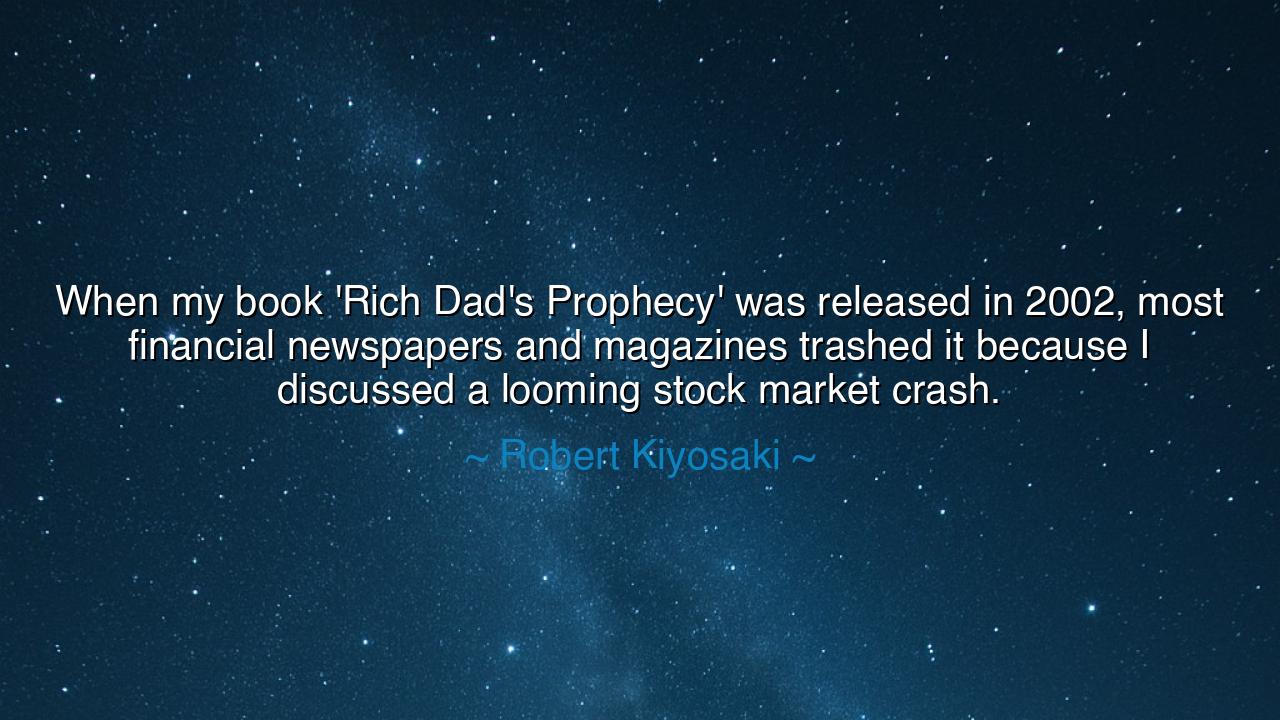
When my book 'Rich Dad's Prophecy' was released in 2002, most
When my book 'Rich Dad's Prophecy' was released in 2002, most financial newspapers and magazines trashed it because I discussed a looming stock market crash.






“When my book ‘Rich Dad’s Prophecy’ was released in 2002, most financial newspapers and magazines trashed it because I discussed a looming stock market crash.” Thus spoke Robert Kiyosaki, the teacher of financial independence and the voice behind Rich Dad, Poor Dad. His words reveal a truth that echoes through the corridors of history—that those who see ahead of their time are often dismissed by those still bound to the comfort of the present. Like the prophets of old, Kiyosaki’s message was not meant to flatter, but to warn; not to soothe, but to prepare. And as in all ages, the world mocked the messenger before it understood the message.
To be a seer in any field—whether of spirit, art, or economy—is to walk a lonely road. The crowd loves reassurance, not revelation. When Kiyosaki released Rich Dad’s Prophecy, the markets were high, confidence unshaken, and the air was thick with optimism. But beneath the glitter of prosperity, he perceived cracks in the foundation—flaws in the debt-driven architecture of modern finance. His warning was simple: a storm was coming. Yet those who profit from illusion cannot bear the sound of truth. So they mocked him, as the priests of old mocked Jeremiah when he foretold the fall of Jerusalem. In every age, the one who speaks unwelcome truth is called alarmist, fool, or heretic—until time proves them right.
When the 2008 financial crisis struck, Kiyosaki’s words returned like thunder remembered. The world watched as the pillars of Wall Street trembled, and what had been dismissed as pessimism became prophecy. But Kiyosaki did not rejoice in vindication, for his warning had never been about glory—it was about awakening. He sought to remind people that wealth built on ignorance is fragile, and that true security lies not in blind trust of systems, but in education, awareness, and discipline. Like a father urging his children to prepare before winter, he spoke not from fear, but from wisdom.
In the story of Cassandra from Greek legend, the god Apollo blessed her with the gift of prophecy but cursed her so that none would believe her. She saw the destruction of Troy, yet her voice was drowned in disbelief. So too, in the halls of finance, those who speak of risk are often ridiculed until disaster makes their words undeniable. But Cassandra’s tragedy—and Kiyosaki’s lesson—reminds us that truth does not require belief to remain true. Reality moves on its own, indifferent to approval. The wise therefore listen not to what is popular, but to what is principled.
The origin of Kiyosaki’s insight lies in the philosophy he learned from his “Rich Dad”—that financial freedom is built not upon trends or speculation, but upon understanding the laws of money, debt, and value. He saw that societies built upon easy credit would one day face the weight of their own illusions. And so he wrote, not to predict doom, but to teach preparation—to awaken in ordinary people the courage to think differently, to invest wisely, to educate themselves before the tide turned. His prophecy was not about despair, but about responsibility: that each person must become the master of their own financial destiny.
The lesson here is not about markets alone, but about life itself. When you speak truth in a world addicted to comfort, expect resistance. When you act on wisdom that others cannot yet see, you will be called foolish. Yet in time, the mockers fall silent, and the steadfast stand firm. The path of foresight demands patience, humility, and courage. Do not bend to the approval of the crowd, for the crowd often moves toward ruin while laughing at the lone voice of caution. Learn to listen to the quiet truths that endure beyond fashion and fear.
So, my child, when the world calls you foolish for seeing danger where others see ease, do not be dismayed. History is carved by those who dared to think beyond the comfort of the moment. Whether in money, in morality, or in meaning, the principle remains: the truth-teller is tested before he is believed. Seek understanding, not applause. Seek foresight, not fortune. And when the storms of life come, you will stand not as a victim of chance, but as one who built upon the rock of wisdom.
For as Kiyosaki’s story teaches, the greatest wealth is not in gold or markets—it is in the clarity of vision that allows one to see the unseen and prepare for what others deny. When others rush blindly into prosperity, learn to pause and think. When they mock, keep building. When they fall, extend your hand. Thus you shall not only preserve yourself, but guide others toward the light that follows the storm—the light of truth, discipline, and enduring wisdom.






AAdministratorAdministrator
Welcome, honored guests. Please leave a comment, we will respond soon